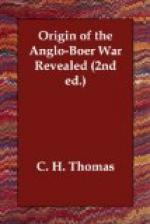The sequel has shown that soon afterwards another spirit was allowed to intrude to displace those good and just sentiments, and that without any reason or provocation and despite a persistently loyal and sincere attitude of friendship and confidence observed towards the Boers by the, British Government and the English people in South Africa. As instances may be cited: (1) England’s conceding spirit in assenting to a modification of the convention of 1881 and agreeing to that of 1884; (2) genial treatment of the colonial Boers on perfect equality with English colonists, sharing in the privileges of self-government, the Dutch language also raised to equal rights with English; (3) most harmonious relations with the Orange Free State; (4) reduction of transit duties for goods to the Republics to 5 per cent, and later to 3 per cent.; (5) unrestricted privilege for the importations of arms and ammunition to both Republics. In lieu of friendly reciprocity the return began to be rancorous mistrust and revival of hatred.
In the course of our study to account for this sad and unwarrantable change on the part of the Boers we will be following the trail of the serpent and track it right up to its Hollander lair and to its at first unsuspected product, the Afrikaner Bond.
PROSPERITY OF BOERS AND POLITICAL RELATIONS WITH ENGLAND UP TO 1881
A period of about twenty-five years following the establishment of the Orange Free State and Transvaal Republics was marked with much progress and prosperity in the Cape Colonies and Natal, both Republics also having cause to rejoice over similar advancement.
The evil influence which aimed at rending good relations between Boer and English became more apparent after 1881. During the preceding era the two races actually had been in a fair way towards friendly assimilation. Mutual appreciation was further stimulated by the reciprocal benefits arising from trade and economic relations. Intermarriages became more frequent under such friendly intercourse, a respectable Englishman being truly prized in those days as a Boer’s son-in-law. The English language also largely advanced in favour and prestige not only among the Cape Colonial and Natal Boers, but also in both Republics, and anti-English sentiments were fast being supplanted by amity and goodwill.
The principal event in the Orange Free State during that period was a three years’ exhaustive war with the Basuto nation, which ended in the latter’s defeat in 1867. Their chief Moshesh then appealed for British intervention. The Basutos thus came under England’s protection, and a peace resulted which has ever since continued, through British prestige and authority as well as good government. The Orange Free State gained a large tract of the territory conquered by that State, but had to renounce the rest.




